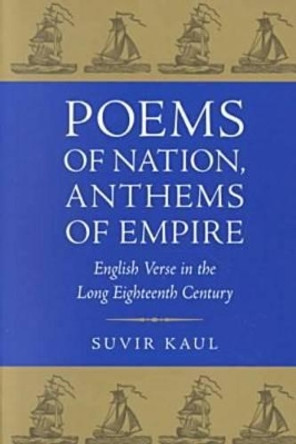Description
About the Author
Suvir Kaul is A. M. Rosenthal Professor and Chair of English at the University of Pennsylvania. He is the author of Poems of Nation, Anthems of Empire: English Verse in the Long Eighteenth Century (Charlottesville: The University Press of Virginia, 2000; Delhi: Oxford University Press, 2001), and of Thomas Gray and Literary Authority: Ideology and Poetics in Eighteenth-Century England (New Delhi: Oxford University Press, 1992; Stanford: Stanford University Press, 1992). He also writes on South Asia and postcolonial theory and has edited The Partitions of Memory: the afterlife of the division of India (New Delhi: Permanent Black, 2001; London: C. Hurst, 2001; Bloomington: Indiana University Press, 2002) and co-edited (with Ania Loomba, Antoinette Burton, Matti Bunzl and Jed Esty), Postcolonial Studies and Beyond (Durham, Duke University Press, 2005).
Reviews
This book addresses the relations between literary culture, English commercial and colonial expansion, and the making of 'Great Britain' in the late seventeenth and eighteenth centuries. This book convincingly challenges both the extremely short historical memory of most postcolonial work and the all too-insularly English world still conjured by period specialists. Hogarthian whores and Grub Street hacks, coffee houses and fashionable pastimes, and the burgeoning of print culture all stand revealed as intimately bound to portents of plantation insurgency, agitation for abolition, and the vast fortunes produced by the labouring bodies of the poor, the colonized, and the enslaved. Eighteenth-century studies has never appeared in a more engaged and fascinating light. -- Professor Donna Landry, University of Kent Kaul succeeds well in his project to situate literary production within the context of the international mercantile anxieties of nation and economy in the long eighteenth century... This is a very valuable and erudite work, short in length but rich in scope and content, beneficial for scholars, graduate students, and undergraduates alike, that serves as a good compendium of sources for further reading and research. The focus on the extratextual mercantile and colonialist phenomena can help dissuade readers from celebrating the meanings of literary texts and encourage them, instead, to reflect upon the forces, not readily evident, that produce those meanings. -- Thomas Paul Bonfiglio, University of Richmond College Literature This book convincingly challenges both the extremely short historical memory of most postcolonial work and the all too-insularly English world still conjured by period specialists. Hogarthian whores and Grub Street hacks, coffee houses and fashionable pastimes, and the burgeoning of print culture all stand revealed as intimately bound to portents of plantation insurgency, agitation for abolition, and the vast fortunes produced by the labouring bodies of the poor, the colonized, and the enslaved. Eighteenth-century studies has never appeared in a more engaged and fascinating light. Kaul succeeds well in his project to situate literary production within the context of the international mercantile anxieties of nation and economy in the long eighteenth century... This is a very valuable and erudite work, short in length but rich in scope and content, beneficial for scholars, graduate students, and undergraduates alike, that serves as a good compendium of sources for further reading and research. The focus on the extratextual mercantile and colonialist phenomena can help dissuade readers from celebrating the meanings of literary texts and encourage them, instead, to reflect upon the forces, not readily evident, that produce those meanings.
Book Information
ISBN 9780748634552
Author Suvir Kaul
Format Paperback
Page Count 208
Imprint Edinburgh University Press
Publisher Edinburgh University Press
Weight(grams) 315g






